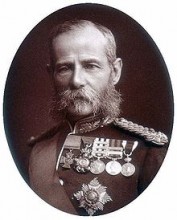
Frederick Sleigh ROBERTS (1832-1914)
Field Marshal Frederick Sleigh Roberts, 1st Earl Roberts (1832-1914) was one of the most successful British military commanders of his time. The nation mourned his death in 1914.
Lord Roberts was born in India on 30th September 1932. Roberts was educated at Eton, Sandhurst and Addiscombe Military Seminary before entering the East India Company Army as a second lieutenant with the Bengal Artillery in 1851.
He served in the Indian Rebellion, the Expedition to Abyssinia and the Second Anglo-Afghan War before leading British Forces to success in the Second Boer War. He also became the last Commander-in-Chief of the Forces before the post was abolished in 1904.
Roberts died of pneumonia at St Omer, France, on 14th November 1914 while visiting Indian troops fighting in the First World War. His body was taken to Ascot by special train for a funeral service on 18th November before being taken to London. After lying in state in Westminster Hall (one of two individuals who were not members of the royal family to do so during the 20th century, the other being Sir Winston Churchill), he was given a state funeral and was then buried in St Paul's Cathedral.
Various comments in the letters reveal what high esteem Lord Roberts was held in.
After his death, the Lord Roberts Memorial Fund gained momentum and, in Badsey, Ethel and Juliet Sladden helped to collect money for the fund. The idea for the fund originated in 1908 when Lord Roberts had set up a fund to help veteran soldiers who were living in poverty. It was due to be wound up in 1914, intended to expire on the death of the last survivor of the Crimea and Mutiny campaigns. Lord Roberts was present at the final trustees’ meeting and remarked that he thought “a European war was imminent and hoped the Society would expand greatly to deal with the casualties that were bound to come”. Lord Roberts died five months later and it was decided to remember him by establishing the Memorial Fund. With the money, workshops for disabled soldiers were set up.
